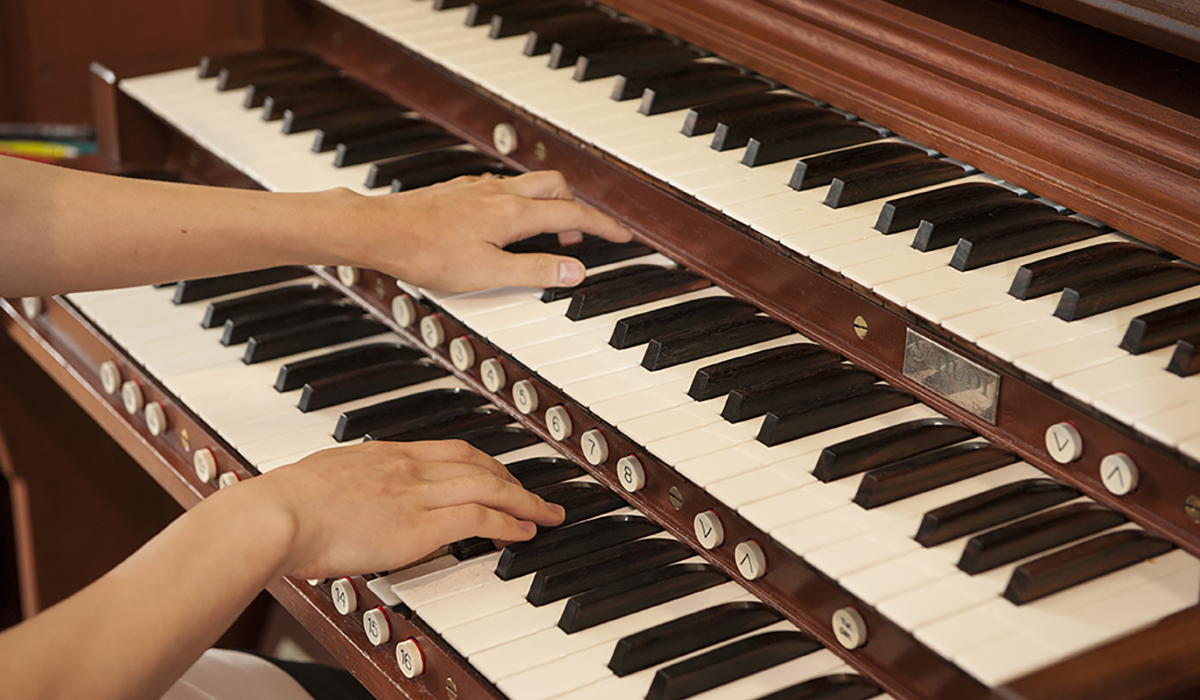
-This program is not yet approved for international students-
Organ studies at CUA have produced musicians working in some of the most important churches in the country. Building upon these successes, the Rome School of Performing Arts offers the Master of Music in Organ Performance.
This program builds on a solid undergraduate foundation in organ technique by cultivating artistic judgment and performance acumen at the very highest level. Studies in organ repertoire, improvisation, and service-playing along with historical and theoretical studies form the academic basis supporting the artistic development needed for a career on the bench as recitalists and church musicians. In addition to the required recital preparation, the program offers several short format opportunities for performance throughout the academic year, often taking advantage of the extraordinary instruments that Washington, D.C. is so fortunate to host.
It is worth noting that the DMV region is rich with opportunities for employment for competent organists, and our students are often called upon to serve as organists and music directors in the churches of our community.
Because of the nature of the sacred music field, all organists receive an integrated instructional component in choral conducting, and have the extraordinary opportunity to conduct our Repertory Chorus.
Entrance Requirements
The undergraduate music degree (typically the Bachelor of Music degree) is a prerequisite except in extraordinary circumstances. Graduate entrance examinations will be administered according to previously stated policy.
Prior to submitting a formal application, persons interested in the Master of Music in Organ Performance degree must communicate with the director of the program. A formal application to the MM in Organ Performance will include the following:
- Letter of Application.
- Current Curriculum Vitae.
- Personal Statement relating candidate's professional goals to the practice of organ performance (500-1000 words).
- Pre-screening Performance Video (does not need to be from an actual performance): video recording of A Prelude and Fugue by J.S. Bach; a major 19th/early 20th-century piece; a piece written after 1930. For the live audition: The same categories, but at least one of the pieces should be different. Other live audition requirements will be stipulated upon invitation to campus.
Invitation to campus for audition, interview, and testing is based on an evaluation of the application materials. Testing consists of demonstration of keyboard proficiency, open score-reading, dictation, and sight-singing.
In addition to these application requirements for the degree program, a formal application to the University through Graduate Admissions is also necessary.
All graduate students entering the Master of Music in Organ Performance must take the Music Theory Placement Examination and the Music History Placement Examination.
| Program of Study: MM in Organ Performance | Semester Hours |
| Sacred and Choral Music | 8 |
| MUS 584 Liturgical Music | 3 |
| MUS 746 Seminar in Sacred Music | 3 |
| MUS 483 Composing for the Liturgy | 2 |
| Applied Skills | 14 |
| MUPI 791 Private Organ Instruction (4 semesters) | 12 |
| MUS 647 Organ Improvisation | 2 |
| Music History | 3 |
| MUS 556 History of Sacred Music | 3 |
| Music Theory | 3 |
| MUS 712 Analytical Techniques II | 3 |
| Music Literature | 6 |
| MUS 516 Organ Literature I | 3 |
| MUS 516A Organ Literature II | 3 |
| Choral Studies | 4 |
| MUS 634 Choral Seminar | 3 |
| MUS 635 Repertory Chorus | 1 |
| Music Performance:MUS 507 Chamber Choir | 0 |
| Non-credit participation in CUA Chamber Choir is required each semester in residence. For this non-credit participation, the student should register for MUS 507A. | |
| Comprehensive Examinations:MUS 698A w/classes; MUS 698B w/o classes (see below) | 0 |
| Recital:MUS 697A w/classes; MUS 697B w/o classes (see below) | 0 |
| Total | 38 |
Graduation Requirements
The student may schedule comprehensive examinations (MUS 698A w/ classes; MUS 698B w/o classes) following the advisor's written approval. The comprehensive examination format is composed of written and oral elements, the particular details of which are determined by the student’s academic advisor in consultation with the major teacher.
A one-hour public recital (MUS 697A w/classes; MUS 697B w/o classes) in the area of concentration is required.
Minor in Latin American Music
Requirements listed above apply, with the following exceptions:
- A minimum of 44 hours of graduate work is required.
- Six semester hours of Latin American music electives are required.A significant portion of the student's performance repertoire for the final recital must consist of music by Iberian or Latin American composers. For the composer, a significant portion of compositions must be works for Hispanic/Latin American liturgical needs.
